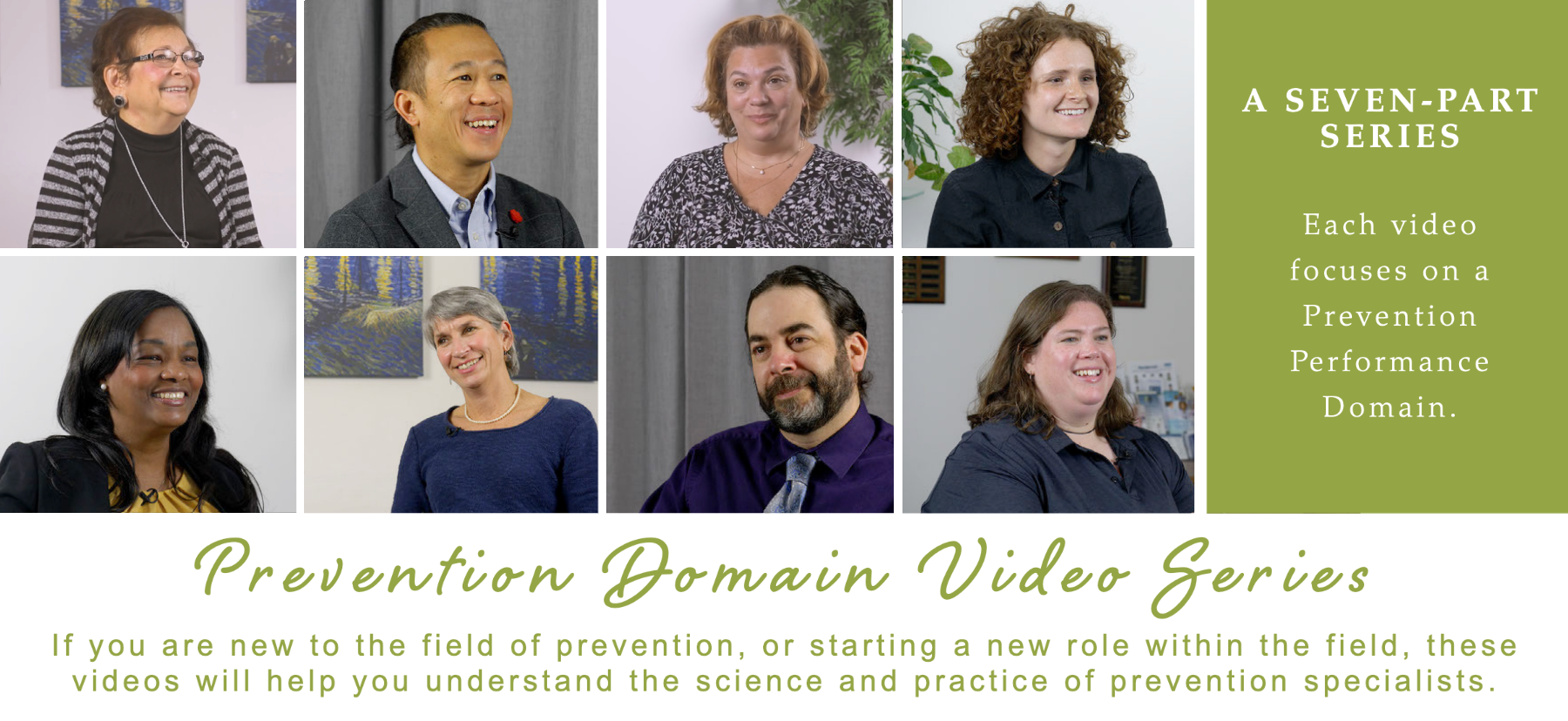Home > Video Series: What Do Prevention Specialists Do?

The prevention domain video series, along with the New England Prevention Specialist Onboarding and Orientation Roadmap, can be very helpful resources for when you are onboarding new employees to your organization who are brand new to the field of prevention. Both the roadmap and video series provides a well-rounded, and evidence-based, overview of what it means to be a prevention professional. This video series was purposefully crafted to provide both the factual information about each of the competencies, but also some great stories and anecdotes to illustrate what these look like in action. We encourage you to weave these into the onboarding process for your new prevention professionals.
|
|
|
|---|---|
|
|
|
Introduction: What do Prevention Specialists Do?This video provides a general overview of what it means to work in the field of substance misuse prevention, what prevention science and practices are, and how the IC&RC Prevention Performance Domains are defined. |
|
|
|
|
Domain 1: Planning & EvaluationThis domain focuses on prevention planning models & theories, logic models, action planning and evaluation techniques, which requires cultural awareness and responsiveness.
It includes tasks such as determining community readiness, identifying existing and needed resources, specifying a target audience, and developing a plan with strategies, evaluation, and a way to sustain your efforts. |
|
|
|
|
Domain 2: Prevention Education and Service DeliveryThis domain focuses on the theories and evidence-based frameworks that guide curriculum and program development and the skills needed to provide services (i.e., knowledge to various substances, cultural awareness, etc.).
Relevant tasks include coordinating prevention activities, delivering education, developing culturally appropriate materials, maintaining fidelity to evidence-based practices, adaptation and serving as a resource to your community on prevention.
|
|
|
|
|
Domain 3: CommunicationThis domain focuses on the communication skills and techniques needs in a wide variety of settings (i.e., program delivery, meeting facilitation, social marketing & media).
Tasks include effective listening, community engagement, promoting culturally responsive programing and public awareness as well as public speaking, group facilitation and marketing.
|
|
|
|
|
Domain 4: Community OrganizationThis domain focuses on determining community readiness, mobilizing your community, and involving your community in all steps of prevention planning as a critical role in gaining community buy-in.
Community organizing includes tasks such as identifying and understanding your community and its cultural diversity, building a group of diverse stakeholders, promoting community ownership, and collaborating and building strategic alliances across your community.
|
|
|
|
|
Domain 5: Public Policy and Environmental ChangeThis domain emphasizes the broader physical, social, cultural, and institutional forces that contribute to community substance use problems.
It includes a variety of tasks to promote and develop strategies and collaborations to promote and advocate for and implement policy changes.
|
|
|
|
|
Domain 6: Professional Growth and ResponsibilityThis domain focuses on knowledge of current theory and practice, work-life balance, knowledge of substances, cultural competency, and professional ethics.
The array of tasks for this domain includes adhering to legal, professional, and ethical principles, self-care, becoming engaged in professional associations, and advocating for wellness across the life span throughout communities. |
Cultural Competence and Humility are cross-cutting principles by which an individual or organization seeks to understand and interact effectively with people who have different values, lifestyles, and traditions based on their distinctive heritage and social relationships. This principle recognizes the need to intentionally respond to cultural and linguistic differences to best serve an individual or an entire community. Discussion of how cultural competence and humility can be incorporated in practice within each domain are included in each video.
Learn more by downloading the New England Prevention Specialist Onboarding and Orientation Roadmap.
This video series was developed by the New England (HHS Region 1) Prevention Technology Transfer Center in response to a recognized need to help educate new prevention staff and prevention partners within CT, MA, ME, NH, RI and VT about the field of prevention.
The New England Prevention Technology Transfer Center program is funded by SAMHSA of the U.S. Department of Health and Human Services (HHS). The contents of New England PTTC products are those of the author(s) and do not necessarily represent the official views of, nor an endorsement, by SAMHSA/HHS, or the U.S. Government.
The contents are those of the author(s) and do not necessarily represent the official views of, nor an endorsement, by SAMHSA/HHS, or the U.S. Government.
For additional questions about this product, please contact Kristen Erickson [email protected].
Browse the New Prevention Specialist Credentialing Interactive Map from the PTTC Network Coordinating Office & The International Certification & Reciprocity Consortium (IC&RC).